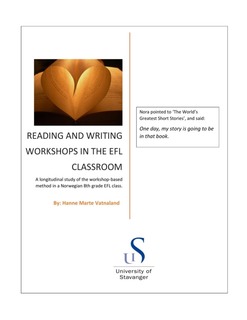Reading and writing workshops in the EFL classroom: A longitudinal study of the workshop-based method in a Norwegian 8th grade EFL class.
Master thesis
Permanent lenke
http://hdl.handle.net/11250/2401912Utgivelsesdato
2016-05-12Metadata
Vis full innførselSamlinger
- Student papers (HF-IKS) [910]
Sammendrag
The current study is based on the implementation of a reading and writing workshop-based program in the English as a foreign language (EFL) lessons of a Norwegian 8th grade class of nine pupils. Seven of these pupils constituted the research group. These seven pupils were followed throughout their school year of English lessons with the applied workshop method.
The aims of the research were to observe the development of the pupils’ English writing competence, motivation and attitudes towards reading and writing in English, and their motivation and attitudes towards the English subject in general.
The implemented program was largely based on Atwell’s (1998) workshop approach. However, while Atwell’s program was designed for a first language context, the current study was carried out in a second language one. Important components of the reading and writing workshops in the study were, firstly, the pupils’ own choice of books to read and texts to write. Secondly, the pupils drafted and received pre-product feedback concentrated on a few specific points. Thirdly, direct instruction was limited to short mini-lectures, where the focus varied, e.g. from to how to come up with titles, to different reading strategies. Finally, the pupils shared their reading with each other, and published their texts in a class book.
The data from the research period was collected through classroom observations, the pupils’ reading journals, and sample texts. There were also two separate semi-structured interviews with each pupil at the beginning of the autumn semester. A questionnaire and follow- up pupil conference about the autumn semester was carried out at the beginning of the spring semester. Finally, an evaluation of the whole project was carried out through a questionnaire at the end of the school year in June.
The findings from the current study showed that all of the pupils improved their English writing after the year of workshop-based teaching. The features of the pupils’ writing that improved varied, and appeared somehow to target the distinct feature(s) which each pupil struggled with the most.
In terms of motivation and attitudes, the pupils who appeared to be positive and motivated for reading and writing at the beginning of the year were still positive by the end of the year. The pupils who appeared negative or neutral at the beginning of the year had not changed their views much after the autumn semester. They were, however, clearly more positive at the end of the spring semester. All of the pupils were positive towards the English subject in general after the year of workshop-based teaching. What the pupils specifically mentioned as positive differences between the workshop-based teaching and regular teaching, were that they did not use a textbook, that they were not assigned with tasks, and that they were allowed to make more choices themselves about their reading and writing.
Reading and writing skills are heavily emphasised in the English subject curriculum. The current study has referred to previous studies and scholars who call for changes in Norwegian EFL education towards a more efficient teaching of reading and writing. To the best of the author’s knowledge, the reading and writing workshop-based program has not been adapted to EFL lessons previously. The fact that this was a longitudinal study spanning one year has strengthened its contribution, which has been to implement and research a method that could potentially offer a successful approach to the teaching of English reading and writing in Norwegian schools.
Beskrivelse
Master's thesis in Literacy studies

